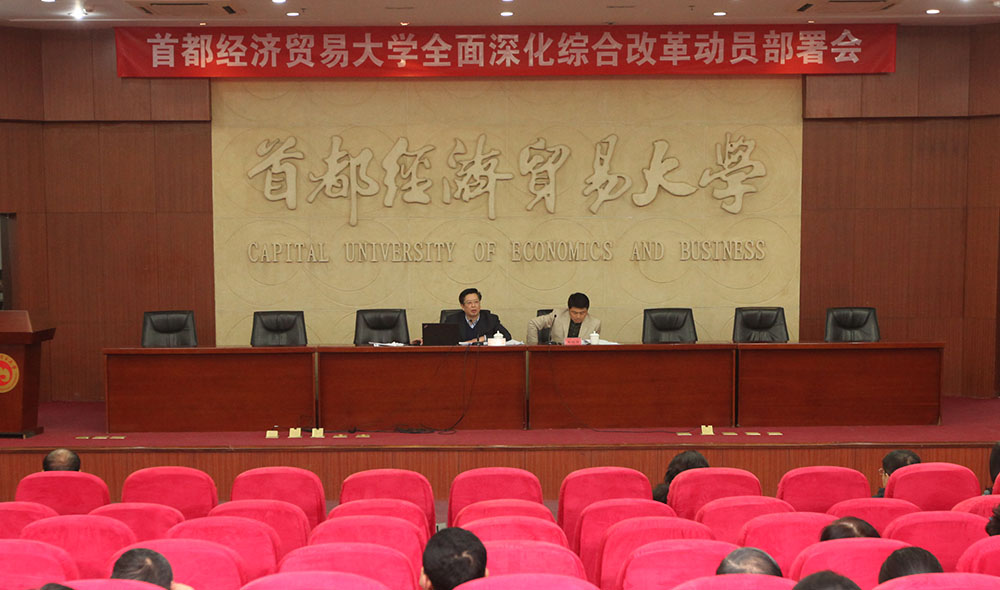CUEB Holds Mobilization Conference on Furthering Comprehensive Reforms

On November 10th, CUEB leadership above the deputy-director level convened at the Lecture Hall for the Conference on Furthering Comprehensive Reforms, during which, Party Secretary Ke Wenjin elaborated on Opinions on Deepening CUEB Comprehensive Reforms (referred to as Opinionshereinafter) and assigned tasks. President Wang Jiaqiong chaired the meeting.
According to Opinions, centerpieces of the reforms are 30 major tasks in 7 areas, including the reforms of student education mechanism, discipline development and collaborative innovation mechanism, human resources system, internationalized school-running mechanism, internal governance, resource allocation upgrade and management mechanism as well as information technology application. To secure vigorous implementation, the 7 fields were further divided into 80 specific items with clear objectives, measures, timeframes and accountability.
Regarding student education mechanism, CUEB will build a diverse, interdisciplinary and collaborative system in a bid to develop a diversified approach to education. The CUEB-specific education architecture features category-based education plans, selective teaching systems, diversified education models and assessment mechanisms. In particular, emphasis of graduate student education will be on the university-school dual management system, thesis quality, curriculum reform plans and advisor accountability.
In discipline development and collaborative innovation reform, CUEB devised a disciplinary development mechanism featuring “university guidance, school dominance and multiparty participation”. The disciplines would be classified into different categories, managed accordingly and evaluated regularly. A disciplinary development performance appraising system and a dynamic adjustment mechanism would be set up to optimize the allocation of resources. To qualify more research teams into the rank of innovation teams of the education ministry and Beijing municipality, efforts for research platforms and think tanks would be intensified; policies to support, assess and review teams would also be put into place.
With respect to human resources reform, CUEB would further improve talent introduction and growth mechanism, set up a diversified talent placement and category-based management system,achieve universal employment and post assignment, roll out regulations on budget-funded employee management, build a new teacher pre-employment and long-term employment mechanism and explore an employee exit mechanism.
Regarding school-running internalization, CUEB would take a top-down approach by first strengthening its leadership, strategies and regulations. On the basis of international student education and joint education mechanisms,the “International Student Study at CUEB” and “Increasing Attractiveness for International Students” projects, more international exchange platforms were expected.
To reform internal governance, CUEB would improve its modern university governance structure with CUEB Charter at its core, sort out the relationship between academic powers and administrative powers, give full play to schools’ dominant role in education, materialize the university-school dual management mechanism and improve democratic management and supervision. Moreover, CUEB would further optimize the allocation of resources, improve budget management system, reform the redistribution mechanism of all kinds of budgeted funds, implement university-school dual budget management and beef up its resource support and service capability.
In the aspect of information technology application, for better decision-making and information services, CUEB would step up its IT overall planning, further information sharing and exploration, and build an one-stop service platform.
More highlights & notices
- CUEB Holds Mobilization Conference on Furthering Comprehensive Reforms
- CUEB Academy of Metropolis Economic and Social Development Holds Symposium
- President Wang Jiaqiong Receives Delegation of Lincoln University (New Zealand)
- MOU Signed Between CUEB and University of New Mexico
- CUEB and Plekhanov Russian University of Economics Sign Inter-university MOU

